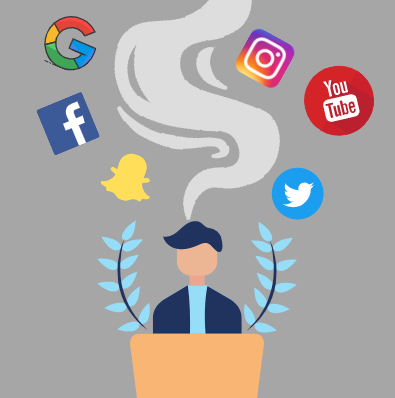Social media hides social issues
Idolizing politicians takes attention away from real problems

The idolization of politicians and use of social media to more effectively connect and interact can be damaging for their constituents. It’s important that we are able to remember who votes to put politicians in office and who keeps them there.
February 24, 2021
Over the past year, politics has been very present in the media and in conversations. With our unlimited access to the internet, interacting with others and gaining information has never been easier. This hyper connection isn’t new and has been developing for years, but something that has become more prominent through the use of social media is the idolization of popular politicians.
Idolizing celebrities and influencers has become a way for users of social media platforms, like Twitter and Instagram, to group themselves and connect with other like-minded people. This creation of “stan” accounts or groups has become more hostile in recent years. When met with an opposing opinion, the interaction between both sides becomes a flurry of insults and threats. Now, we are seeing a shift in who exactly qualifies as a “celebrity.” We’ve moved away from movie stars to the public servants elected to represent the people of the United States.
This is a cause for concern.
We can’t expect politicians, people whose job entails trying to spread their policies and influence/sway the masses, to responsibly discourage this type of behavior from their “followers.” Of course, we can’t assume that all politicians will choose to take advantage of the attention, however, this slope they are excited to balance on is steep and slippery considering that they are still human. Making the politicians’ personalities the center of attention surrounding their office and policies takes away crucial awareness that should be placed on their ideals and beliefs. It’s important that we don’t get blinded by the personable side of these politicians that can cloud our judgment of their political choices.
Senior members of Congress, like Minority Leader Mitch McConnell, have achieved a Twitter following of 2.1 million while newer, younger members, like Alexandria Ocasio-Cortez, have garnered an impressive 12.5 after only being elected into Congress in 2018. This new wave of politicians is simply more comfortable with using social media to interact with their constituents and even opposing members. There is nothing more engaging on social media than callouts or clapbacks, and with platforms like Twitter and Instagram, the followers of these politicians can now join in and share their beliefs and views.
There, of course, can be outcomes from this that can greatly impact the political scene both positively and negatively. There seems to be an increasing interest in politics recently which ties into a plethora of other sources but what we want to consider is the effect of a politician’s personality and likeability which allows for the significant jump in followers they gain, especially from younger generations. This is illustrated in “2020 turnout is the highest in over a century” published by The New York Times which stated, “more Americans voted in the 2020 election — two-thirds of the voting-eligible population — than in any other in 120 years.” The increasing interest can help members of less represented groups become more involved in politics which allows them to influence the types of policies being passed and the connection/outcome they can have in those communities.
Being able to connect with younger generations is a political home run. With the internet always a click away and what seems like an instantaneous connection with the entire world, it is safe to say that the newly emerging Gen Z kids are comfortable, to say the least, online. Getting the opportunity to interact with these impressionable social media experts is the fastest way politicians are now able to campaign.
PEW Research found that people between the ages of 18 and 29 are more likely to comment online about social and/or political issues based on the surveys done on 14 countries. Being able to understand that this is a job for them is still a key point in this argument. What these politicians are doing is simply what they view as a part of their job; however, it’s crucial that we remember the true job of a politician is to serve and meet the needs of the people, not the other way around.
On one hand, the politicians that don’t encourage or feed into this kind of behavior are simply caught in the crossfire. Of course, they are going to want to continue to increase their following to spread their messages and policies, but they understand how it should be handled in regards to the government.
Being able to help and improve the lives of those who are supposed to be represented does not require the constant interaction that we currently have. We can’t expect politicians and government officials to not use social media. We should encourage them to appropriately use the internet so that the government can become more open to everyday citizens. That is one of the biggest positive impacts social media has on the relationship we hold with our current government.
Social media has allowed people the ability to see more clearly how their government operates and how effective it truly is in helping improve people’s quality of life. The Organization for Economic Co-operation and Development (OECD) states on their website that “government’s competence – its responsiveness and reliability in delivering public services and anticipating new needs – are crucial for boosting trust in institutions.” With a decline in trust between the government and the American people, the interactions held between politicians and internet users could be a crucial factor in holding those in power accountable for their actions.
It’s widely known that government officials make promises during the campaign trail in the hopes that they can win over more supporters. It’s also widely known that those promises and selling points are regularly misleading or pushed aside. In an article published to USA Today titled “When it comes to campaign promises, presidents usually try, often fail,” reporter Rick Hampson writes, “Woodrow Wilson, re-elected in 1916 on the slogan ‘He kept us out of war,’ led the U.S. into World War I in 1917. Lyndon Johnson campaigned against Barry Goldwater in 1964 as the peace candidate, only to entangle the nation in Vietnam.” The act of falling short of the policies promised by these politicians isn’t new and seems to have become a strategy many current officials utilize. However, when we look over these misleading guarantees because we get blinded by their charisma it allows us to overlook their true intentions and goals. This can be very damaging to the constituents these politicians are meant to be representing because it can put their needs on the back burner, if not completely thrown aside.
We, however, no longer have to accept that the ideas and policies that were championed at us by the politicians that now represent us. With the increasing interaction and cult-like following these politicians are gaining online, we now can hold these people accountable for the things they promise to American people, as well as, the actions they take in achieving their own personal goals, which may not represent the will of the people. The government is meant to serve the people and not the other way around, that is something we need to remember.






